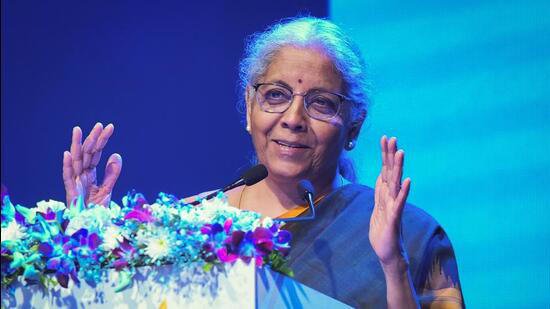India’s Finance Minister, Nirmala Sitharaman, expressed confidence that the country will continue to navigate global trade disruptions effectively, asserting that India’s resilient economy and proactive measures will help it weather the ongoing challenges in international trade. Amidst increasing volatility in the global market, including the aftereffects of the COVID-19 pandemic, geopolitical tensions, and supply chain bottlenecks, India is positioning itself as a leader in adapting to a rapidly changing global economic landscape.
Sitharaman’s comments were made during a recent address where she outlined India’s economic outlook and the government’s plans to address the challenges posed by global trade disruptions. The finance minister emphasized that India’s strong domestic demand, robust economic fundamentals, and expanding global trade partnerships would help mitigate the impact of any external shocks.
India’s Strategic Positioning in Global Trade
India has been facing several global trade disruptions in recent years, including rising inflation, supply chain interruptions, and geopolitical tensions that have disrupted the global supply of goods. However, Sitharaman remains confident that India’s economic and policy frameworks are well-positioned to handle these challenges and continue its growth trajectory.
One of the key factors that make India resilient to global trade disruptions is its diverse and expansive domestic market. With a population of over 1.4 billion, India’s internal demand for goods and services has played a crucial role in stabilizing its economy, even as external markets face volatility. Domestic consumption has been a key driver of economic growth, and Sitharaman pointed out that India’s strong consumer base will help buffer the country against external trade shocks.
Moreover, the Finance Minister stressed that India is actively working to diversify its trade relationships with multiple regions across the globe. As the country shifts from being overly dependent on certain trading partners, particularly in light of the ongoing geopolitical tensions and the China-US trade war, it has sought to strengthen its relationships with countries in Europe, the Middle East, and Africa. Additionally, the Regional Comprehensive Economic Partnership (RCEP) and Free Trade Agreements (FTAs) with various countries and regions are expected to further expand India’s global trade footprint.
Government Initiatives to Strengthen Trade Resilience
The Indian government has been actively taking steps to strengthen the country’s trade resilience. Sitharaman highlighted the Make in India initiative, which aims to boost domestic manufacturing and reduce dependence on imports. This initiative, which has received widespread support from Indian entrepreneurs, is designed to make India a global manufacturing hub, particularly in sectors such as electronics, automobiles, and pharmaceuticals. By encouraging local production, India aims to improve its self-sufficiency and reduce vulnerability to supply chain disruptions.
The government is also pushing forward with policies to attract foreign direct investment (FDI), which is expected to bring in the capital and technology necessary to boost industrial capabilities and expand export capacity. The production-linked incentive (PLI) schemes introduced in several sectors are designed to encourage both domestic and international companies to set up manufacturing facilities in India. Sitharaman noted that the success of the PLI schemes in sectors such as electronics and textiles has already started to pay dividends, making India more competitive in the global marketplace.
Another key policy initiative is the simplification of trade procedures. India is improving its logistics infrastructure to ensure that goods move more efficiently across the country and to international markets. Investments in ports, airports, and railways are aimed at reducing logistical costs and improving overall supply chain efficiency. The Finance Minister pointed out that these improvements are essential for strengthening India’s position as a global trade hub.
Building Resilience Through Digital Transformation
Sitharaman also emphasized the role of digital transformation in ensuring that India can continue to thrive amidst global disruptions. With the rapid growth of digital technologies and e-commerce, India is seeing a shift toward digital trade that will further integrate it into the global economy.
The government has been focusing on initiatives such as the Digital India program, which aims to increase internet penetration and improve digital infrastructure across the country. With a growing tech-savvy population and the increasing use of digital platforms for trade and business, India is positioning itself as a digital powerhouse. By expanding the e-commerce sector, India can continue to tap into global markets even during times of disruption.
Furthermore, digital tools are being used to streamline customs clearance, trade documentation, and cross-border payments, making international trade smoother and more efficient. This digital shift is expected to enhance India’s global competitiveness and make it a preferred partner for international trade.
Strengthening India’s Global Trade Role
In her address, Sitharaman also underscored India’s increasing influence in global economic forums such as the World Trade Organization (WTO), the G20, and the BRICS grouping. India’s active participation in these forums has enabled it to shape global trade policies and advocate for fairer trade practices that benefit developing nations.
As global trade experiences continued disruption, India’s ability to navigate these challenges successfully will depend not only on its domestic policies but also on its diplomatic efforts. Strengthening ties with key trade partners, negotiating fair trade agreements, and playing an active role in international economic governance will help India expand its influence on the global stage.
Looking Ahead
While global trade disruptions are expected to continue in the short term due to geopolitical tensions, inflationary pressures, and supply chain challenges, India’s strong economic fundamentals, strategic policy initiatives, and growing global partnerships put it in a strong position to weather these storms. Finance Minister Nirmala Sitharaman remains optimistic about India’s ability to emerge stronger from these global challenges, driven by its resilient domestic economy, robust trade policies, and the ongoing digital transformation.
India’s continued focus on boosting domestic manufacturing, enhancing digital trade, and fostering international partnerships will allow it to navigate the disruptions effectively, ensuring sustainable growth and expanding its presence in the global economy. As the world grapples with ongoing uncertainties, India’s proactive approach to managing trade disruptions signals a future of economic resilience and global leadership.

